Friday, June 20th, 2025 | By

Women in the Oil rich Albertine region of Western Uganda are calling for quick interventions to curb the increased cases of gender based violence in their areas.
During a one day community engagement meeting for the EACOP affected women in Buseruka sub country Hoima district, the women expressed fear over what they termed increased cases of Gender based violence against women.
“Women in this area are no longer living a dignified life. The more the oil related activities increases, the higher the cases of GBV against women. We appeal to the concerned to come to our rescue, explained Ms. Nyandera Mary of Nyakabingo village in Buseruka Sub County.
Women who attended the outreach meeting were from oil-rich Hoima and Kikuube Districts and where met as part of the efforts by the National Association of Professional Environmentalists, NAPE and Community Green Radio to give a voice to the vulnerable communities especially those affected by the EACOP.
Lucy Mbubi from Butimba in Kikuube district explained that after being compensated, families get into turmoil and men abandon homes.
“After getting money for compensation, most men abandon their home, shifted to trading centers and married young girls. They left after causing havoc including battering their wives”, she narrated.
The authorities seem overwhelmed by these cases of GBV. Margaret Ruhiigwa, the district women council chairperson, says the cases are too many.
“As you are trying to mediate one family, more cases emerge and you find yourself in a dilemma. We are appealing to government and partners to come and help us because women are suffering”, explained Mrs. Ruhiigwa.
She faulted government for building houses for the resettled persons in a camp design, causing discomfort among women occupants. Ruhiigwa said prior to relocation, people lived on widely spaced land.
“Women who once had privacy in their homes are now exposed to the entire camp community yet secrecy among them is paramount in their life. This is violence against women.”
The United Nations Population Fund says violence against women and girls is one of the most prevalent violations in worldwide. UNPF estimates that one in three women worldwide will experience physical or sexual experience in her life.
The United Nations Development Programme, UNDP says, globally, 35 percent of women have experienced sexual harassment. UNDP works with executive, legislative and judicial branches of government, security agencies, public prosecutors, women’s groups, civil society organizations and movements, private sector, traditional, community and religious leaders to end GBV.
Copyright ©2026 Community Green Radio . All Rights Reserved. Designed : Lwegatech